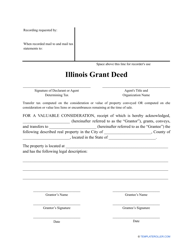
However, the deed must reference the information contained in the contract. In modern real estate transactions, the parties often get around trying to cram all of this information into the deed by having an ancillary real estate sales contract. The deed must also clearly identify the seller and purchaser, the date on which the transfer becomes legally effective and pertinent information such as the purchase price. To be valid, an absolute sale deed must clearly describe the property being transferred, either by address or other distinguishing information. When the seller signs and delivers the absolute sale deed, this is generally recognized by law as the moment of sale. An "absolute sale" deed is defined by having no conditions attached to the sale except the buyer's payment of the purchase price. The deed proves the transfer, but, if properly recorded with the county recorder, it serves to give other prospective purchasers notice that all of the seller's rights in the property have now passed on to another party. A deed is a document that states that one party is transferring his real estate property rights to another.

The deed of absolute sale is used in many real estate sales.

The difference between a deed of sale and a deed of assignment is that the deed of sale is used once and has no conditions other than the purchase price of the property, while the deed of assignment can be used anytime to transfer contractual rights from one party to another.


 0 kommentar(er)
0 kommentar(er)
